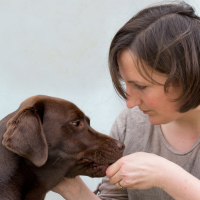Biography
Clinical research fellow/associate lecturer, University of Cambridge, UK
I am interested in how genes influence metabolism. In dogs, selective breeding has resulted in an unusual genetic architecture which makes mapping disease associated loci remarkably tractable with much smaller numbers than in human populations. We study pet dogs and use comparative genomics to identify genes that are responsible for determining obesity susceptibility in dogs and humans. The mechanism of action and physiological consequences of variants of interest are tested in the lab in cellular models, and at a whole-dog level by examining their effect on eating behaviour and physiology. Our overall aim is to better understand how genes link to obesity in both dogs and humans, in order to reveal mechanistic links and identify targets to improve obesity prevention and treatment.
I am a veterinary surgeon with specialist clinical qualifications in small animal medicine. In 2013 I set up the GOdogs Project, investigating the genetics of obesity in dogs. The work was initiated at the Institute of Metabolic Science in Cambridge as a Wellcome Trust Clinical Research Career Development Fellow and I took up a University Assistant Professorship at the Department of Physiology, Development and Neuroscience in 2021. That means I have to teach and serve the department as well as driving research in the lab. I have 2 young children and worked 80% FTE to balance work and childcare commitments when they were younger, although I now work full time. I have benefited from having a strong mentor network myself and am happy to act as a mentor via this scheme.


